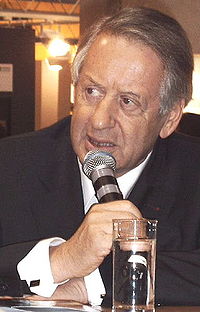
Paul Spiegel
Encyclopedia

Zentralrat der Juden in Deutschland
The Zentralrat der Juden in Deutschland is a federation of German Jews organizing many Jewish organisations in Germany. It was founded on July 19, 1950, as a response to the increasing isolation of German Jews by the international Jewish community and increasing interest in Jewish affairs by the ...
(Central Council of Jews) in Germany and the main spokesman of the German Jews
Judaism
Judaism ) is the "religion, philosophy, and way of life" of the Jewish people...
. He was widely praised for his leadership of the German Jewish community, which had grown from the remnants left by the Nazis into the third largest Jewish community in western Europe.
Survives Holocaust
Paul Spiegel was born into a WestphaliaWestphalia
Westphalia is a region in Germany, centred on the cities of Arnsberg, Bielefeld, Dortmund, Minden and Münster.Westphalia is roughly the region between the rivers Rhine and Weser, located north and south of the Ruhr River. No exact definition of borders can be given, because the name "Westphalia"...
n family of cattle
Cattle
Cattle are the most common type of large domesticated ungulates. They are a prominent modern member of the subfamily Bovinae, are the most widespread species of the genus Bos, and are most commonly classified collectively as Bos primigenius...
dealers, originating from the small town Versmold
Versmold
Versmold is a town in Gütersloh District in the German state of North Rhine-Westphalia. It is located some 30 km west of Bielefeld.- History :...
. After the Nazi rise to power, the family fled at first to Brussels
Brussels
Brussels , officially the Brussels Region or Brussels-Capital Region , is the capital of Belgium and the de facto capital of the European Union...
. Spiegel survived the Holocaust in Flanders
Flanders
Flanders is the community of the Flemings but also one of the institutions in Belgium, and a geographical region located in parts of present-day Belgium, France and the Netherlands. "Flanders" can also refer to the northern part of Belgium that contains Brussels, Bruges, Ghent and Antwerp...
where he was hidden by a family of farmers. Prior to that, his sister Rosa had been arrested during a police raid in Brussels; she was later killed in Bergen-Belsen
Bergen-Belsen concentration camp
Bergen-Belsen was a Nazi concentration camp in Lower Saxony in northwestern Germany, southwest of the town of Bergen near Celle...
. His father was arrested and held in Buchenwald, Auschwitz, and Dachau, but survived to reunite with Spiegel and his mother in Warendorf after the war. Spiegel described these events in his book At home again? (Wieder zu Hause?).
Journalist
In 1958, he began practical training as a journalist with the Allgemeine Jüdische Wochenzeitung, now the Judische Allgemeine, in DüsseldorfDüsseldorf
Düsseldorf is the capital city of the German state of North Rhine-Westphalia and centre of the Rhine-Ruhr metropolitan region.Düsseldorf is an important international business and financial centre and renowned for its fashion and trade fairs. Located centrally within the European Megalopolis, the...
. He was also active as an editor at this newspaper until 1965, when he became editor of the Jewish Press Service and assistant to the secretary-general of the Zentralrat der Juden. During the 1960s he worked for various other newspapers as well.
Rises within Zentralrat der Juden
In 1993 he became a member of the executive committee of the Zentralrat der Juden, first as vice president and later (as of 9 January 2000, following the death of Ignatz BubisIgnatz Bubis
Ignatz Bubis , German Jewish leader, was the influential chairman of the Zentralrat der Juden in Deutschland from 1992 to 1999. In this capacity he led a public campaign against German anti-Semitism...
) as president. On 11 February 2004, Paul Spiegel received an honorary doctorate from the Heinrich Heine University in Düsseldorf, and was made an honorary citizen of Warendorf
Warendorf
Warendorf is a town in North Rhine-Westphalia, Germany, and capital of Warendorf District.The town is best known today for its well-preserved medieval town centre, for horse-riding, and the opportunities it provides for cycling...
, the city of his birth. Since 1986 he ran an agency for artists and media in Düsseldorf.
Wins equal status for Jewish community in Germany
On the 58th anniversary of the liberation of Auschwitz in 2003, Spiegel and Chancellor Gerhard SchröderGerhard Schröder
Gerhard Fritz Kurt Schröder is a German politician, and was Chancellor of Germany from 1998 to 2005. A member of the Social Democratic Party of Germany , he led a coalition government of the SPD and the Greens. Before becoming a full-time politician, he was a lawyer, and before becoming Chancellor...
signed an agreement that granted Germany's Jewish community the same legal status as the country's Christian religions, thereby tripling annual government funding of the Zentralrat der Juden to $3.8 million.
Outspoken as leader
Spiegel was an outspoken critic of lawyers who took what he felt were overly large fees to represent Jews who had been slave laborers during World War IIWorld War II
World War II, or the Second World War , was a global conflict lasting from 1939 to 1945, involving most of the world's nations—including all of the great powers—eventually forming two opposing military alliances: the Allies and the Axis...
, saying "Earning money should not come before moralistic intentions." He also criticized the national Holocaust Memorial in Berlin, stating at its dedication in 2005 that it failed to address the basic question, "Why were members of a civilized people in the heart of Europe capable of planning and carrying out mass murder?"

